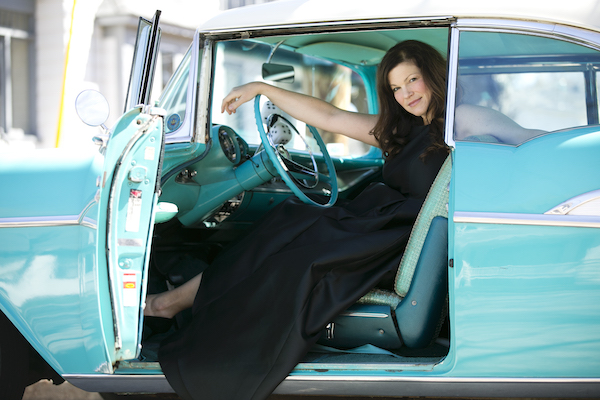Jan 13, 2026 2:09 PM
More Trump-Kennedy Center Cancellations
The fallout from the renaming of the John F. Kennedy Center for the Performing Arts to include President Donald…

Singer Staci Griesbach’s debut is devoted to jazz arrangements of songs popularized by country star Patsy Cline (1932–’63).
(Photo: Kim Thiel)Staci Griesbach’s story begins in the rural Midwest. She grew up on a Wisconsin farm, where her parents raised heifers. Corn, soybeans and hay filled the family field, and four-track tapes of Conway Twitty and Ernest Tubb filled the glove compartment. At rodeos and county fairs, she would watch wide-eyed as Alan Jackson or Faith Hill entertained.
Eventually, Griesbach developed her own singing style, infused with her phrasing on piano and saxophone, which she played in high school band. Still, country music was her base, and she pondered moving to Nashville to pursue stardom. Instead, after college, she moved to Los Angeles—just for a year, she promised herself—to check it out before heading to Music City. Once in L.A., Griesbach found herself drawn to the city’s jazz circles, taking vocal lessons and picking up some gigs. When the time felt right to make an album, though, the vocalist began asking herself some serious questions.
“[O]ne day when I came home from yoga, I put Patsy Cline’s Greatest Hits on the record player,” she recalled. “The minute the needle went down, I was like, ‘Hello? What was I thinking? Maybe this is my thing. My teachers could be different from someone else’s teachers.’ Is that a bad thing? Is that a good thing? Why can’t it just be a different thing?”
Griesbach’s debut, My Patsy Cline Songbook, was born of that revelation. Its 16 songs, each delivered in a jazz setting, are hallmarks in the late country star’s repertoire. The program features the work of top-notch arrangers and players from the world of jazz (pianist Tamir Hendelman and guitarist Bruce Forman) and the world of country (pedal steel guitarist Rich Hinman). Griesbach achieves her aim of paying tribute not through imitation, but by exploring new possibilities through her own artistry.
“Walkin’ After Midnight” is transformed into a spectral rumination, with mallets casting deep indigo shades, rather than rhythms, on cymbals and drums, with pianist Jeremy Siskind reforming the chord changes into moody and unresolving noir harmonies.
Every performance is an experiment whose payoff has everything to do with Griesbach’s guidance.“Staci let me know that she wanted to find places where these two musics could meet,” Hendelman said. “I thought that was a beautiful idea. For example, she brought in this song, ‘Leavin’ On Your Mind.’ Something about its melody reminded me of ‘Someone To Watch Over Me.’ I thought that maybe we could play with that, hint at it but not really give it away until halfway through the solo.”
“That was an ‘aha’ moment,” Griesbach explained with a laugh. “We were at [Hendelman’s] piano and as he played with the chord progression, it was like, ‘Oh, yeah!’ Then we thought about the juxtaposition of the lyric of ‘If you’ve got leaving on your mind, tell me now.’ The spiritual connotation in the background is, ‘You’re looking for someone to watch over you.’ Isn’t that beautiful?” DB

Belá Fleck during an interview with Fredrika Whitfield on CNN.
Jan 13, 2026 2:09 PM
The fallout from the renaming of the John F. Kennedy Center for the Performing Arts to include President Donald…

Peplowski first came to prominence in legacy swing bands, including the final iteration of the Benny Goodman Orchestra, before beginning a solo career in the late 1980s.
Feb 3, 2026 12:10 AM
Ken Peplowski, a clarinetist and tenor saxophonist who straddled the worlds of traditional and modern jazz, died Feb. 2…

The success of Oregon’s first album, 1971’s Music Of Another Present Era, allowed Towner to establish a solo career.
Jan 19, 2026 5:02 PM
Ralph Towner, a guitarist and composer who blended multiple genres, including jazz — and throughout them all remained…

Rico’s Anti-Microbial Instrument Swab
Jan 19, 2026 2:48 PM
With this year’s NAMM Show right around the corner, we can look forward to plenty of new and innovative instruments…

Richie Beirach was particularly renowned for his approach to chromatic harmony, which he used to improvise reharmonizations of originals and standards.
Jan 27, 2026 11:19 AM
Richie Beirach, a pianist and composer who channeled a knowledge of modern classical music into his jazz practice,…